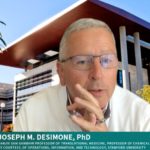Blog
Posts Tagged ‘Precision Health and Integrated Diagnostics’
2021 Virtual PHIND Symposium
April 13, 2021

Dr. DeSimone gestures wearing an Oura monitoring ring, which made the news recently as the company partnered with the National Basketball Association (NBA) to help monitor the health of players.
The 2021 Precision Health and Integrated Diagnostics (PHIND) Center at Stanford held the virtual PHIND Symposium on March 23, 2021. The event showcased the exciting PHIND work that is going on campus-wide, featuring current PHIND investigators and Precision Health experts. Professor of Radiology Dr. Garry Gold gave an update on the PHIND center, reflecting upon former Radiology Chair Dr. Sanjiv Sam Gambhir’s visionary leadership and the continuation of this work, now with Dr. Gold’s direction, aimed at monitoring health to identify early transitions from health to disease.
Discussions included one with Dr. Joseph DeSimone, recently named recipient of the Sanjiv Sam Gambhir Professorship in Translational Medicine, who stated that although he is new to PHiND, his group has been thinking about precision delivery, using new devices such as microneedles to deliver treatments locally, rather than systemically throughout the body. Dr. Utkan Demirci, leading the Canary Center at Stanford, discussed his group’s Exosome-Total-Isolation-Chip (ExoTIC) device for identification of exosome-based biomarkers for monitoring health from a variety of biological fluids.
Besides devices, like the one in the picture, there was a focus on data. What kinds of data are we capturing as the clinical enterprise has transformed through Covid and telehealth? Can we separate patients into cohorts with online and in person visits to optimize the clinical workflows? How can we access and mine data from non-identifiable electronic health records? Participants also discussed ways to ensure equity in access to these devices and data, as well as ways to ensure clinical trial participants are engaged in meaningful ways in monitoring their health.
The Precision Health and Integrated Diagnostics Center (PHIND) at Stanford is dedicated to longitudinal monitoring and improvement of overall human health on a lifelong basis. Stanford advancements in biology and technology are leading to the potential to understand disease risk, detect disease early and enable preventative interventions.
